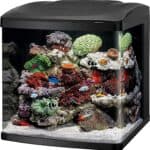The betta fish is a popular pet that is available in many colors and patterns. Plus, these fish can live long lives if provided with proper care, which makes them a great companion.
This blog post discusses how long betta fish live, some reasons why they might be dying sooner than expected, and some tips on what you can do to make your betta’s life longer.
How Long Do Betta Fish Live?
Betta fish live for an average of two to three years, but some have been known to live for up to six years. In fact, there have been reports of bettas that have lived for over ten years!
The goal is for your betta to live as long as possible. While ten years may be a stretch, we can definitely work to make sure your betta lives as long as possible.
How to Help My Betta Live Longer?
You can help your betta live longer by providing him or her with the right living conditions.
Food
Just like with humans, bettas need a healthy diet to live for a long time. Bettas should eat a diet that is high in protein and low in fat. Live food, such as bloodworms, is a great source of protein for bettas.
Most of their diet should consist of good quality pellet food. Pellets that are designed for bettas are a great choice and can be found at most pet stores.
While peas and other small pieces of vegetables (and even bread) are fine, they should only be given as a treat and not as the main part of their diet. Too many carb-heavy foods can cause your betta to become bloated or start becoming fat.
Tank size
It is important to provide your betta with the right tank size to help him or she live a long life.
For one or two fish, a five-gallon minimum tank should be provided. A ten-gallon aquarium would be even better for this purpose. Twenty-gallin tanks are ideal if you are keeping multiple fish together in the same tank.
The bigger the tank, the better. You can even divide a betta tank to separate fish if they start getting territorial and fighting with each other.
Water quality
The water quality in your betta’s tank is also important.
Bettas like a warm, slightly acidic environment with a pH of around six to seven. The temperature should be kept between 78 and 82 degrees Fahrenheit.
Regular water changes are necessary to keep the water quality high in your fish’s tank. At least 25% of the water should be changed weekly.
Keeping ammonia to a minimum is key for betta fish living long lives. Ammonia buildup happens when the bacteria in your tank breaks down waste products like uneaten food or dead plants.
You can find ammonia test strips at any pet store and will want to use them regularly to make sure there is no ammonia buildup in your tank.
Filter
A good quality filter is also important for keeping the water clean and your betta healthy.
Bettas are not fans of strong currents, so look for a filter that creates a gentle current in your tank. Filters with carbon inserts are great at removing toxins from the water, which will help keep your betta healthy.
Introducing a filter into your tank can sometimes startle your fish, so it is best to get one that is adjustable and can be turned down low at first. Alternatively, you can baffle your betta filter to reduce the noise it makes.
Low-stress environment
Betta fish are very sensitive to their environment and can become stressed easily, which can lead to health problems and shorten your betta’s lifespan.
One way to help reduce your betta’s stress is by providing a low-stress environment. This means keeping the tank clean, having plenty of hiding places for him or her to hide, and not overcrowding the tank.
If your betta is stressed, he or she may become inactive, stop eating, or start showing signs of illness.
I believe that plants are a must in a betta tank to help with filtration and to provide a natural and low-stress environment. Live plants also help oxygenate the water, which is good for your fish.
Common Reasons for Betta Dying Prematurely
While bettas are relatively hardy fish, there are some reasons why they may die prematurely.
One common reason for betta death is water temperature being too high or low. Bettas need warm waters between 78 and 82 degrees Fahrenheit to live long healthy lives. If the temperature in their tank dips below this range, it can lead to stress and illness.
Another common cause of betta death is overfeeding. Bettas are naturally picky eaters, so you should only feed them as much food as they will consume in five to ten minutes.
Poor water quality is also a common reason for bettas dying prematurely. Ammonia buildup, high levels of nitrates and chlorine, and low pH can all cause stress and illness in your fish. Regular water changes are necessary to keep your betta fish healthy and living a long life.
Unfortunately, this is too much work for a lot of betta owners who may not realize how much work is required to keep a betta healthy. Then once a betta does become sick, it can be difficult to determine what is wrong and the fish may die before you figure out what was wrong.
Conclusion
In conclusion, there are a few things you can do to help your betta live a long and healthy life. Keeping the water temperature between 78 and 82 degrees Fahrenheit, doing regular water changes, keeping ammonia levels low, and providing a low-stress environment are all important in keeping your betta healthy.
If your betta does start showing signs of illness, it is important to take him or her to a veterinarian who specializes in fish care. Many times, these veterinarians will be able to diagnose the problem and treat your betta quickly and easily, which may save his or her life.
The average betta lives for just two to three years. However, I hope the tips in this guide will help you extend your betta’s lifespan and provide him or her with a long and healthy life.
If you follow the guidelines in this guide, I believe that you can help your betta live for up to five years or more. All the best!






